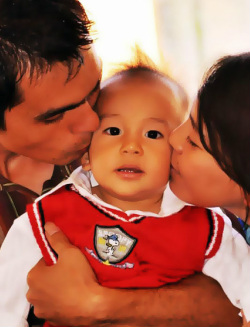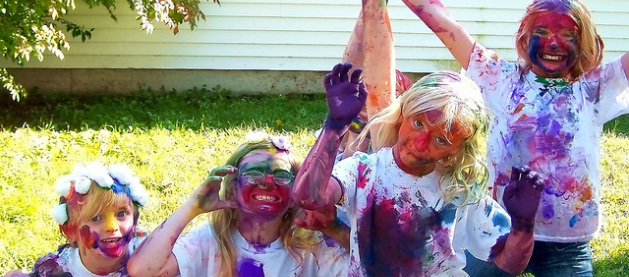 Taken from Grow Up Reading (website) Emergent literacy: Use proper vocabulary when you talk to your baby. For example, say “toes” instead of “piggies.” This helps your child learn the rules of language with minimal confusion. Babies use gestures to communicate before they can talk. Encourage your baby to use simple gestures and signs (such as clapping for saying “please,” or touching their chest to say “thank you”), which can increase a baby’s understanding of language and accelerate language development. Help your baby hear the different sounds that make up words (phonemic awareness) by saying or singing nursery rhymes. Rhyming words share similar sounds—”dock” and “clock” in the classicHickory, Dickory, Dock, for example. Nursery rhymes place rhyming pairs of words in prominent positions to naturally draw a child’s attention to these sounds. By hearing pairs of rhyming words, babies begin to understand that words are made up of separate sounds, a critical reading skill. In addition to reading traditional picture books, use interactive books: books with flaps, textures, smells, and sounds to encourage exploration and stimulate your baby’s senses. Point to images on a page and name them; this helps increase vocabulary. Also talk about what is going on in the story; this helps develop comprehension skills. Use dialogic reading when you read aloud. The basic premise of dialogic reading is adults and children having a conversation about a book. Ask your baby “what” and “why” questions about the story, pause, and then answer your questions. Introducing this type of reading and questioning early will help your child become more comfortable with the process of dialogic reading when he or she is actually using words. Cognitive development: Play with toys that react, pop up, make noise or move to help your baby understand cause and effect. Between 9 to 12 months, most children will begin to play independently with toys and enjoy toys that react or make noise. Babies this age will begin exploring objects in many different ways (shaking, banging, throwing, and dropping) and begin to use objects correctly (shake a rattle, drink from a cup, listen to a phone). Play peek-a-boo games. Young babies have not developed a sense of object permanence—the understanding that unseen objects still exist. Start by hiding your face behind a blanket and then peeking out at baby. Put a scarf over your head and let your baby pull it off; hide objects underneath boxes and let your baby knock the box over to retrieve the object. Motor development: Give your baby plenty of freedom to move around on the floor. Young infants need to spend time on both their back and stomach in order to develop the muscles for the significant motor development that takes place in the first 15 months. Spending too much time in an infant swing or seat will hinder development of motor skills. Continue with lots of floor play as your child grows and begins crawling and walking. Add climbing challenges such as cushions, ramps, and tunnels to refine gross motor skills. Games that further develop hand-eye coordination and fine motor skills include building and knocking over block towers; covering and uncovering containers; taking toys apart and putting them back together again; picking up balls or objects in motion; turning knobs and pages of a book; scribbling and finger painting; and making shapes out of clay. Social and emotional development: Play finger and hand games like pat-a-cake and peek-a-boo; encourage your baby to imitate these gestures. Gesturing is a way babies communicate before talking. When you respond to your baby’s gestures, you reinforce his efforts to communicate. Sing songs with your baby. Music stimulates the cognitive and emotional areas of the brain. Encourage dramatic play through imitation of your actions in everyday activities—household chores, hobbies, entertaining, etc. Tell your baby what you are doing and prompt him to imitate you. Pretend play helps refine motor skills and foster a sense of accomplishment. Read books about daily routines such as brushing teeth, washing hands, putting on shoes, and taking a bath. These books encourage children as they prepare to learn and master these actions.
0 Comments
 What is unconditional love? It's just what the phrase implies—loving a person without any prior conditions, because of who the person is and not because of what the person does.--Zig Ziglar * Exceptional children are just that—exceptions. The vast majority of our children are not dazzlingly brilliant, extremely witty, highly coordinated, tremendously talented, or universally popular! They are just plain kids with oversized needs to be loved and accepted as they are.--James Dobson * Comparing yourself or your child from an analytical or critical point of view and wishing your child was this or that can steal your happiness, your inspiration, and your peace of mind and contentment, not to mention the effect it will have on your child. Children remember things very clearly and are directly affected by their parents’ attitude and how their parents feel and think about them. So if you’re constantly speaking faith and positive things about your child, either to him or to others, and if you’re thinking positive things about your child, this will have a good, faith-building, positive effect on your child, and he’ll likely become more like what you think of him and expect from him. But if you are thinking or speaking negatively about your child, either directly or indirectly, it can make him think negatively about himself and hinder his happiness and self-esteem, his performance, and the way he sees himself. Faith begets more faith; positive attitudes foster more positive attitudes in both yourself and those around you. It often takes showing faith in someone to bring out the best in them.--Jesus, speaking in prophecy * The spirit of approval means that you love your child even when he resists you or is in an ugly mood. He must know that his personal worth is not based on beauty, brains, or behavior, but on the simple fact that he is a person created by God.--Dan Benson4 * To build a relationship of love and respect, you must remember that your children respond to you according to the way they feel about you. If those feelings are ones of love and respect, you will receive obedient, loving responses from the children because that is what they want to do. … There's no real unity without respect.--Zig Ziglar * Children thrive on praise. It's more important to praise a child for his good works and his good behavior than it is to scold him for his bad behavior. Always accentuate the positive.--David Brandt Berg * Ways to show love and respect to children * Don't dismiss your child's feelings. Respond with love. * Don't command your child and expect him to come to attention without so much as an explanation. Approach him respectfully and lovingly when you need to ask a favor—trying to be sensitive and coming across with a considerate and sweet spirit. * Make eye contact with your child, and go down to your child's level when talking to her; for example, when you're telling her something or passing on instruction. * Take a little bit more of your time to slow down and really tune in to your child. Treat your child's ideas as important. Don't quickly shoot them down. If the idea is unreasonable, even though your child might not understand all the whys and wherefores, try to explain as much as you can. * Don't make fun of a child when he’s made a mistake or done something more on the silly side. This can really hurt his feelings. This doesn't mean that you shouldn't teach your child to learn to laugh things off when things go wrong, but pray for discernment, because sometimes your child may just need a moment of understanding. * When your child needs correction, help her not to feel embarrassed by correcting her as privately as the situation warrants. * Find a way to connect with each of your children individually. * Show your children that they're important to you by how you treat them. Give your children the same level of attention that you expect them to give you. * When your child comes to tell you something, stop and listen. Give her your full attention and respond to what she is saying. Don't listen halfway, while thinking about something else and continuing to do what you're doing. * Stop and acknowledge your child.--Maria Fontaine * Encourage your children’s unique qualities and characteristics: Know each child well as an individual. You can't help a child build confidence around his inherent gifts and talents unless you come to know what those gifts and talents are. Two ways to learn: (1) In private chats with the child, time spent together watching and appreciating; and (2) in organized time, spent as husband and wife, discussing each child, sharing perceptions, taking notes, discovering together more about the personality and individual character of each child. Genuinely respect each child and his own gifts. Our children are human beings, deserving not only our love but our respect. With this thought in mind, sometimes it becomes a bit easier to (1) show an added measure of faith in them after any kind of failure; (2) discuss our own failures with them and tell them what we learned; (3) praise their accomplishments lavishly and honestly, particularly accomplishments in areas where we perceive special aptitude; and (4) never criticize or tear down the children personally. Make sure they still know our total love for them. Never criticize in public—praise in public, correct in private. [Teach] independence, self-reliance, responsibility at an early age.Confidence and its joy tie directly into being able to do useful things. Each child should have a job in the family, for the family—particularly daily or weekly jobs—for which he is praised and made to feel very able and very important, very much a part of the family. Help the children to see what their own unique gifts are—and that these gifts are as good as anyone else's.--Linda and Richard Eyre * Your children depend on you to be an example of My love to them in a way that they can understand, grasp‚ comprehend, and feel. If you don't show them My love, how will they know that I love them? You are a manifestation of My love for them. Children are fragile in their emotions, even those who don't seem to show it as much, and I want to show them that I love them, that I care for them, and that I want to be close to them and do special things for them. Your love manifested in time spent with them is one of the biggest ways that a child feels My love through you. And just as I love you so dearly, so do I love them—more than you can imagine.--Jesus, speaking in prophecy Courtesy of http://anchor.tfionline.com/post/love-builds-children/. Photo by Stenly Lam / Flickr
Love is the cornerstone.
Differences must be overcome with love.
Parents, treat your children gently and in love.
Parents should govern their children with authority, tempered with patience, mercy, and truth.
All Bible verses from NIV and ERV, unless otherwise indicated. Originally created by Activated Magazine; used with permission. From Jesus with Love
Text courtesy of Activated! magazine. Photo by 123rf.com My husband’s grandma, Nana Mae, was someone who never lost sight of the beauty around her. There wasn’t a time you were with her that she didn’t compliment you, or tell you how pretty something was. I’ll never forget the time Mike and I drove her to Los Angeles for Christmas. We were at a gas station along our drive on I-5 when Nana suddenly pointed her finger out the window and said, “Beautiful.” I looked to see what she was talking about… All I saw was a green garbage truck pulled over near the gas station. That’s a beautiful green,” she said, shaking her head. She was looking right at the truck. I smiled. She was talking about a garbage truck, but still, she saw beauty in it. As moms, we can choose whether or not we see the beauty, too. We can look for the beautiful right in the middle of what sometimes feels like the garbage of our days—the messes all over the house, the kids’ arguing, the crazy running around. And we play a huge role in whether or not we set a “beautiful” tone for our families. Are you carrying the beauty? Or are you seeing the garbage truck (like I did) instead of its rich, green color? Are you catching the memories that are being made right in front of you, or are you losing your patience and longing for just-one-minute-alone? Are you savoring today, or do you just want time to speed up so your kids grow into the next phase when, hopefully, things will be easier? Are you stopping to love and soak in these moments of being a [parent] to a newborn, a six-month-old, a two-year-old, or even a teen? It’s sometimes hard to do (believe me, I know), but that is where the real beauty is—in those intentional moments of soaking it in, in those choices to appreciate and marvel at all that comes with being a [parent]. When we do, we find it. We find the beautiful. Wishing you many beautiful moments today!--Adapted from Genny Heikka Adapted from http://www.mamapedia.com/voices/finding-the-beautiful. Photo by D Sharon Pruitt via Flickr.com.
|
Categories
All
Archives
March 2024
LinksFree Children's Stories |




 RSS Feed
RSS Feed
